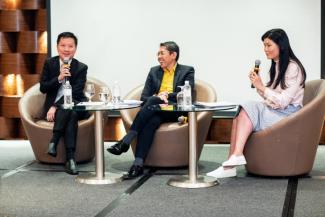
At the SMU Behavioural Sciences Institute Conference 2019, a keynote panel highlighted the need to pay more attention to some non-academic attributes for public service and political leaders.
Above: Panellists – Professor David Chan, Director of the Singapore Management University Behavioural Sciences Institute (far left) & Dr Mohamad Maliki Bin Osman, Senior Minister of State for Defence and Foreign Affairs (center); Moderator – Ms Melissa Kwee, Chief Executive Officer of National Volunteer & Philanthropy Centre (far right)
SMU Office of Research & Tech Transfer – Responding to questions by Members of Parliament during the debate on the budget for the Prime Minister’s Office on 28 February 2019, Mr Chan Chun Sing, the Minister-in-charge of the Public Service, said that educational qualifications while useful as a “valid proxy” will not be sufficient for selecting future leaders in the Singapore Pubic Service. The Government is looking for individuals with initiative, creativity and the ability to be a team player, he added.
Just a few days before Minister Chan made these comments in Parliament, the importance of academic abilities versus non-academic attributes were given a full-day discussion at a conference held on 22 February 2019 with the theme “Much More Than Academic Abilities”. The conference, organized by the Behavioural Sciences Institute (BSI) of the Singapore Management University (SMU), was attended by 300 participants from the public, private and non-profit sectors.
One important non-academic attribute that good leaders have is the ability and willingness to “see things from another’s perspective”, said Professor David Chan, who is the Director of the Behavioural Sciences Institute. This involves seeking out and listening to viewpoints from people of different backgrounds, especially those with differing views or positions from oneself. Leaders need to get out of their comfort zone and not surround themselves with people who always say only the good things, Professor Chan added. He was speaking on a keynote panel, with fellow keynote speaker, Dr Mohamad Maliki Bin Osman, Senior Minister of State for Defence and Foreign Affairs.
During his speech before the panel discussion, Professor Chan had cautioned that an academically smart person who is proactive but has poor situational judgment effectiveness can be a “liability” when put in top leadership positions.
Listening to the ground
If there is one leadership position where listening to the ground and situational judgment effectiveness are paramount, it would be that of a politician, Dr Maliki said. Not only do political representatives have to effectively communicate government policies to the public, they also have to gather feedback in the process, some of which may be critical.
Dr Maliki recounted the learning curve he experienced as the Member of Parliament for the East Coast Group Representation Constituency (GRC), where he had to manage mainly private estates instead of the public estates that he was familiar with in his previous constituency. Dr Maliki shared that the two take-home messages he learnt during this episode were accepting feedback and acknowledging one’s mistakes.
“At the end of the day, instead of a situation where we focus on who to blame, we should understand that we are a community and we all share a common goal, and so let’s work together to figure out the solutions. I think it requires a lot of change in the way politicians engage with others, but it applies to everyone – politicians, citizens, teachers, parents and all,” Dr Maliki said.
Image credit: Behavioural Science Institute